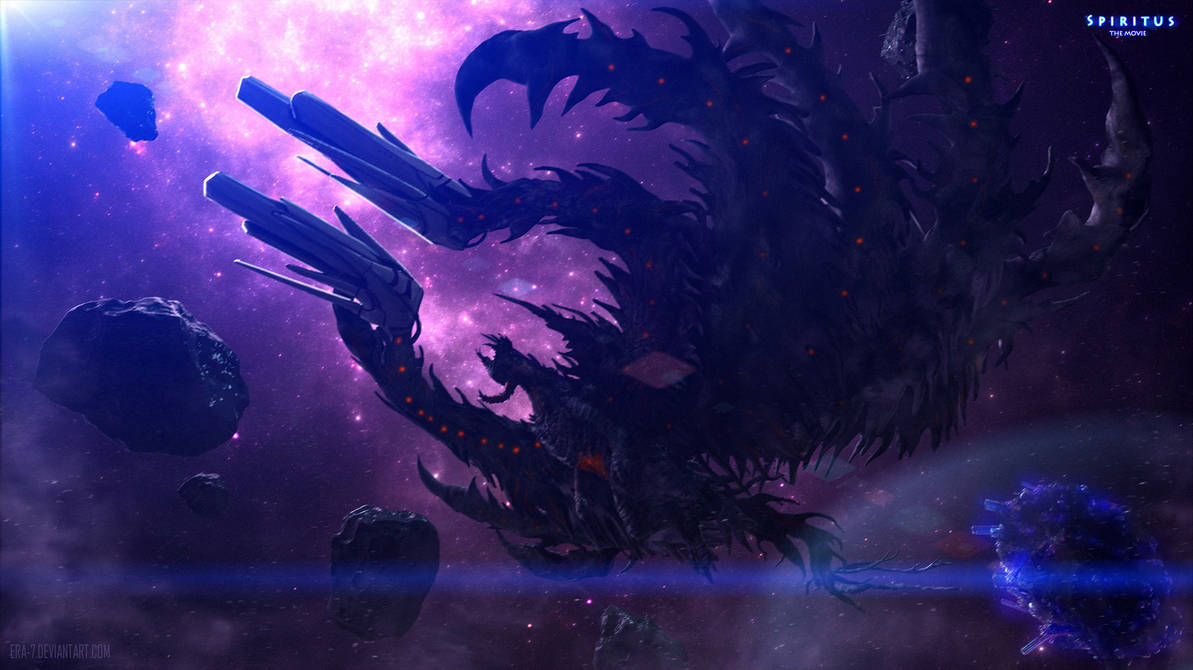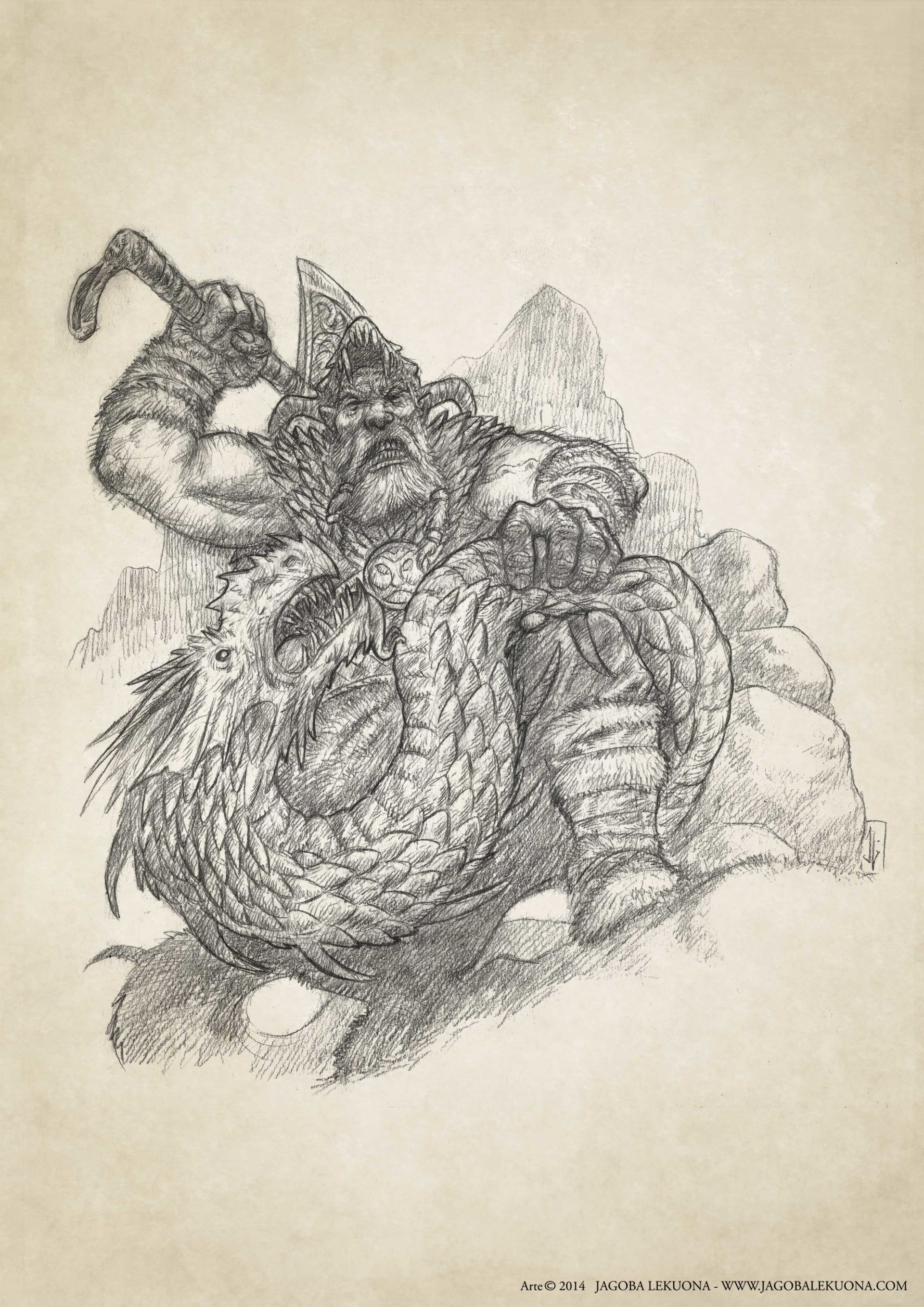...by wyverns we mean dragons, of course: it's just hard to resist the lure of alliteration.

The short answer is, of course, that dragons represent something terrible and awesome and unfathomable, which is as close a description of a god as one could make. The fact remains, however, that no human has ever laid eyes on a true dragon (unless of course you include the ancestors of the Varanesi and Hylemesi among the humans, as the scholars of the New College do, but then they don't believe in dragons). Humans inherited the belief in these terrible lizards from the
kizagu, whose veneration of the mythical wyrms is well documented.
There are some radical sages in the enlightened cities of the north who maintain that the dragon is little more than an exaggeration of a much simpler, though no less ancient foe: the serpent. This idea alone does not make them radical, but the route they followed to arrive at this conclusion is what causes consternation among more conservative circles. Apparently, humans are descended from tree-dwelling apes, whose daily battles with deadly serpents somehow transformed into legends of flying fire-breathers. Their case hinges on the similarity between our skulls and those of the Malawaskan jungle ape; their rivals offer them fresh fruit and peanuts still in their shells.

The truth, as ever, is an odd blend of contemporary science and ancient wisdom: dragons were real, and humans were derived from ape (though not tree-dwelling apes, Malawaskan or otherwise). Most importantly, as the ancients professed, dragons are worthy of worship. Dragons are (or were) the ultimate expression of the terrible, awesome nature of the divine. Likewise, the divine is the ultimate expression of reptilian superiority.
Existence began when the primal chaos of the void, absent any means or laws to prevent anything from happening, birthed the iridescence, the aberrant chaos. It is most commonly depicted as a rainbow serpent, shedding its skin, the manifestation of will and drive and the power of determination. It is the dragon at the beginning and the end of time.
In the prime materia, the visible universe, the iridescence and the void are locked in battle, and here countless fragments of the aberrant chaos have birthed hundreds of millions of inhabited worlds, each following the same pattern: wherever organic life emerges, sooner or later it will evolve into the epitome of ruthless cunning and drive, the reptile. Hundreds of millions of times the reptiles birthed the terrible lizards and from them came the mighty dragons, and ultimately they built civilisations that spanned the stars.
 |
| Space Dragon Argont 2 by Era-7 This is what you get when you google "space dragon"... I was pleasantly surprised. |
In one little world orbiting a yellow star and possessing just one moon, things did not quite follow the same plan. When the asteroid struck, those few dragons that survived hid deep in the caverns of the earth, and fell into an eon-long hibernation. When the primitive cave-apes awoke them, millions of years had passed, and they were shocked to find that the reptiles no longer dominated the land, sea and air. In their absence the ocean had spawned greater horrors than dragons, and the skies were almost black with crows. Mischievous spirits played in the forests without fear, toying with the lives of the creatures that surrounded them. Most shocking of all was the abundance of mammals: their fur, their "live" births and their lactation disgusted the dragons absolutely.
 |
| It's enough to make you sick to you scales, right? |
The dragons, though small in number, possessed an intrinsic understanding that their destiny was not unfolding as it should and sought to take possession of their world. Yet they were scuppered at every turn by the abominations ruling the oceans and the fey creatures ruling the forest. In desperation, they used their primitive magics to create a slave race to hasten their ascendancy. However,these proto
kavalds - born of the mixing of dragon's blood with lesser reptiles - proved dim-witted and puny, and did little to further their ambitions. In council with one another, the great dragons contemplated the unthinkable: mixing their blood with that of the mammals.
 |
| For a blog about dragons, there're a lot of pictures of apes... |
The dragons never had to stoop so low. The most ancient tomes of draconic lore state that one of the forest spirits, for reasons unknown, gifted the dragons powerful transmutation magic. And with that magic they took the ugly apes of the cave and created the first of the giants: those that would one day call themselves the
Titans.
 |
| Uranus by Boris Vallejo |
The giants pushed back the spirits of the forest with ease, either subduing or exterminating them. The path was cleared for the foundation of a true draconian civilisation, though it would be built by the hands of the mammalian giants. The giants erected the first cities under the watchful eye of their overlords, whilst in the caverns of the earth the slavish kavalds began to harvest gold. Gold gave the dragons greater power, the most important of which was the power to reproduce. Dragons wanted power. They also wanted to proliferate.
 |
| A man named after a cheese rides a dragon. |
It did not take long for the kavalds to exhaust ready supplies of gold, and the feeble lizards did not have the capacity to reach deeper in the earth. The dragons, for their part, were unwilling to lend their own brute strength to this endeavour, as its primary concerns are the feasting on flesh and sleeping. In sleep a dragon's intellect may well dwell on higher things, one can only surmise, but during its waking hours a dragon's principal concerns are base. And so it came to pass that the dragons called upon the giants to dig into the mountains and fetch their precious gold, and this was to be their undoing.
The motives of the woodland spirit who granted the dragons the transmutation have been lost to the sands of time. Why an entity would sow the seed's of its own race's near-extinction remains a mystery. Certainly, these spirits are nothing if not ruinously capricious, ad they are known to be entertained by both misery and merriment in equal measure. What is known is that the gift of magic was not without cost, for within its action was sown a simple seed of destruction. The creation would possess the wilfulness and pride of their creators.
Simply put, the giants had seen the dragon creators as equals, not masters: when they were put to work in the mines, they rebelled. And though the precise details of that conflict are another tale (to be told another time); note that the final outcome was a world with neither dragons nor giants. If god truly is a dragon, what then does that make the titans who slew god's children?











No comments:
Post a Comment